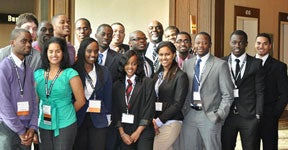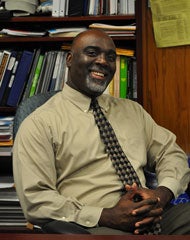 KINGSTON, R.I., Feb.18, 2016—“Go see Chuck.” That would be Charles A. Watson, assistant director of minority recruitment for the University of Rhode Island’s College of Engineering who helps students of color find their way—on campus, at labs and in life.
KINGSTON, R.I., Feb.18, 2016—“Go see Chuck.” That would be Charles A. Watson, assistant director of minority recruitment for the University of Rhode Island’s College of Engineering who helps students of color find their way—on campus, at labs and in life.
The 51-year-old URI graduate is devoted to his students, and that work has now been recognized nationally. The National Society of Black Engineers will honor him as minority engineering program director of the year during the 42nd annual conference March 26 at the Boston Convention and Exhibition Center.
“I’m humbled,” says Watson, a longtime Cranston resident. “I’m also proud to represent my University. I feel a lot of pride for the work we’ve done, and I’m grateful for the support from URI.”
 Since he joined the College of Engineering in 2004, minority enrollment has increased from 3 percent to 13 percent—a rise attributed to Watson’s tireless efforts to recruit minority students beginning as far back as grade school. Once they get to URI, Watson stays in close touch with the students, helping them with everything from professional internships and laboratory research with professors to social issues and financial concerns.
Since he joined the College of Engineering in 2004, minority enrollment has increased from 3 percent to 13 percent—a rise attributed to Watson’s tireless efforts to recruit minority students beginning as far back as grade school. Once they get to URI, Watson stays in close touch with the students, helping them with everything from professional internships and laboratory research with professors to social issues and financial concerns.
If job placement is a measure of success, the program is a hit. Thanks to the students’ talent and Watson’s mentoring, graduates have found work at businesses throughout the country, including Eaton Aerospace, Lockheed Martin, Google, Amazon, FM Global, National Grid, Johnson & Johnson, Toray Plastics and the Naval Undersea Warfare Center.
For Watson, the work is a labor of love: “Their story is my story.”
Born in Hammond, La., a small town outside of Baton Rouge, Watson was raised by a family of teachers. At age 6, he moved to Providence with his mother so she could teach music at Nathan Bishop Middle School. He lived on Camp Street on the city’s East Side, not far from his grade school, Martin Luther King Jr., where most of his friends and neighbors were black.
In 1976, he moved to Cranston, and “culture shock” set in. “Let me put it this way: I was the only brother in the classroom,” he says. “It was tough. It was very different for me.”
Sports were his ticket to success. He excelled at basketball and track in middle school and continued down that path in high school, where the three-star letterman also played running back and defensive back in football. The high school was majority “all-white,” he says, but he was learning how to “enjoy the environment and engage everyone.”
In short, he was becoming “Chuck Watson, the person,” not just “Chuck Watson who could run, jump, shoot baskets.” A turning point came when he was voted most popular his senior year instead of most athletic. He was so upset he stormed out of the awards dinner. His mother sat him down: “Son,” she said, “don’t you get it. They see you as more than just an athlete. They see you as ‘Chuck,’ something very special.”
His next stop was URI, where he played football and also received guidance from the late Leo DiMaio, founder of URI’s Talent Development Program, which provides mentoring and academic help to students so they can fulfill their potential.
Watson left school briefly and worked as a chef and then returned to URI, getting his degree in family studies in 1993. He worked as a counselor in a group home and as a substitute teacher, before landing a job as director of enrichment programs at the Times² Academy charter school in Providence, a position that eventually led him to the engineering college at URI.
Black, Latino and Native American students still lag far behind whites and Asians in their participation in math, science, engineering and technology fields. Since 2000, underrepresented minorities’ participation in engineering and physical sciences has been flat and their share in mathematics and statistics has dropped, according to the National Science Foundation.
Getting students interested in engineering early is crucial to turn things around, Watson says. Under his guidance, URI offers engineering workshops to young Rhode Island students during the summer and school breaks, where they get experience building robots, taking apart lawn mowers and strengthening their math skills so they’re prepared when they get to college. They also learn how to work as a team.
“Having the opportunity to guide and mentor students is phenomenal,” he says. “I can relate to them because I’ve been through what they’ve been through. I know what it’s like to climb these hills.”
Many students face what he faced growing up: raised by a single mother; the target of discrimination; living in an all-white or mostly-white community; financial pressures. He encourages students to come to him with their concerns, and they do. “Go see Chuck,” is what students tell each other.
“These students need someone who can mentor them and help them because the road can be bumpy,” says Watson. “For me, it’s all about the future. It’s about opportunity. Our job is to help support their careers as best we can.”
He credits the dean’s office in the College of Engineering with having the vision to ensure that opportunities are available to students of color. “When I stand up on that stage to accept the award,” says Watson, “there will be a lot of ‘thank yous.’ ”
For more information click engineering college.
Pictured above: Charles Watson, assistant director of minority recruitment for the University of Rhode Island’s College of Engineering.
University of Rhode Island engineering students and members of the URI chapter of the National Society of Black Engineers.
Photos courtesy of Charles A. Watson.

